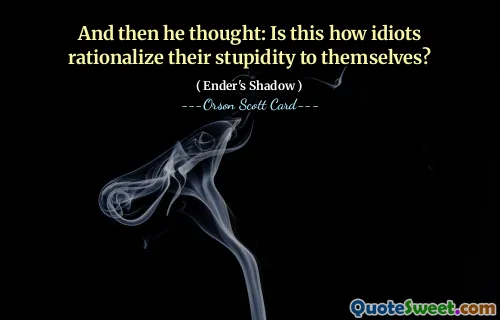It's not evil, Rand. I know something evil when I smell it. This isn't evil, it's just incredibly stupid.
In "A Memory of Light" by Robert Jordan, a significant moment arises where a character distinguishes between true malevolence and foolishness. This quote encapsulates the idea that actions or decisions that seem misguided or unwise may not stem from malicious intent. Instead, they often reflect a lack of insight or understanding rather than a genuine desire to cause harm. This perspective encourages readers to consider the motivations behind actions. The character’s insistence on recognizing the difference between evil and stupidity suggests a deeper commentary on human behavior and judgment. It emphasizes the importance of discernment in assessing situations, urging individuals to analyze intentions before labeling actions as evil.
In "A Memory of Light" by Robert Jordan, a significant moment arises where a character distinguishes between true malevolence and foolishness. This quote encapsulates the idea that actions or decisions that seem misguided or unwise may not stem from malicious intent. Instead, they often reflect a lack of insight or understanding rather than a genuine desire to cause harm.
This perspective encourages readers to consider the motivations behind actions. The character’s insistence on recognizing the difference between evil and stupidity suggests a deeper commentary on human behavior and judgment. It emphasizes the importance of discernment in assessing situations, urging individuals to analyze intentions before labeling actions as evil.




